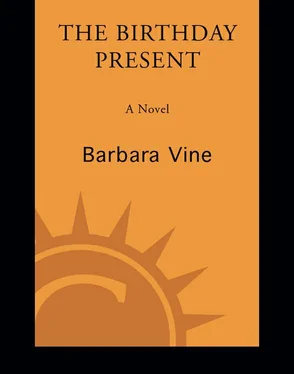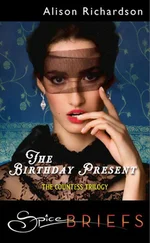Barbara Vine - The Birthday Present
Здесь есть возможность читать онлайн «Barbara Vine - The Birthday Present» весь текст электронной книги совершенно бесплатно (целиком полную версию без сокращений). В некоторых случаях можно слушать аудио, скачать через торрент в формате fb2 и присутствует краткое содержание. Год выпуска: 2008, ISBN: 2008, Издательство: Crown Publishing Group, Жанр: Триллер, на английском языке. Описание произведения, (предисловие) а так же отзывы посетителей доступны на портале библиотеки ЛибКат.
- Название:The Birthday Present
- Автор:
- Издательство:Crown Publishing Group
- Жанр:
- Год:2008
- ISBN:978-0-307-45199-6
- Рейтинг книги:5 / 5. Голосов: 1
-
Избранное:Добавить в избранное
- Отзывы:
-
Ваша оценка:
- 100
- 1
- 2
- 3
- 4
- 5
The Birthday Present: краткое содержание, описание и аннотация
Предлагаем к чтению аннотацию, описание, краткое содержание или предисловие (зависит от того, что написал сам автор книги «The Birthday Present»). Если вы не нашли необходимую информацию о книге — напишите в комментариях, мы постараемся отыскать её.
The Birthday Present
The Birthday Present — читать онлайн бесплатно полную книгу (весь текст) целиком
Ниже представлен текст книги, разбитый по страницам. Система сохранения места последней прочитанной страницы, позволяет с удобством читать онлайн бесплатно книгу «The Birthday Present», без необходимости каждый раз заново искать на чём Вы остановились. Поставьте закладку, и сможете в любой момент перейти на страницу, на которой закончили чтение.
Интервал:
Закладка:
Also by Barbara Vine
The Minotaur
The Blood Doctor
Grasshopper
The Chimney Sweeper's Boy
The Brimstone Wedding
No Night Is Too Long
Anna's Book
King Solomon's Carpet
Gallowglass
The House of Stairs
A Fatal Inversion
A Dark-Adapted Eye

1
Thirty-three is the age we shall all be when we meet in heaven because Christ was thirty-three when he died. It's an interesting idea. One can't help thinking that the people who invent these things chose it because it's an ideal age, no longer one's first youth but not aging either. It was Sandy Caxton who told me this when I sat next to him at Ivor's birthday dinner, his thirty-third of course, and Ivor said afterward that Sandy had a store of that sort of wisdom. My own opinion is that Sandy was just changing the subject because I'd asked him if he lived in London.
“I'm awfully sorry,” he said, “but I can't tell you that.” And, noticing my mystified look, “I used to be the Northern Ireland Secretary, you see, and we're not supposed to tell anyone where we live.”
I did see. I should have known. Ivor told me there was even a bodyguard somewhere at the party, and wherever it was that Sandy lived the police with sniffer dogs searched the local church before he went to matins. Not that it did him any good in the end. They still got him at the time they chose. But more of that later. Iris had been sitting next to Ivor's friend Jack Munro, a favorite of hers, and it was rather reluctantly that she said good-bye to him, as she and I had to leave before the others. We had a trustworthy babysitter, but we wanted to get back to Nadine. She was our first child, the first of our four, and we were both so besotted that we fretted if we were away from her for long. Even to celebrate her uncle's heavenly birthday. Even when she was in the care of one of her grandmothers.
There was one person close to Ivor (in a manner of speaking) absent from the party.
“Ivor's girlfriend wasn't there,” I said as we were going up Fitzjohn's Avenue.
“She wouldn't have been asked. You know Ivor. In some ways he's living in the distant past. One doesn't invite the mistress to meet one's friends.” Iris made the face she always used to make when her brother's peculiarities came up, her smile a little rueful. “Besides, having to spend an evening out with her instead of in with her he'd think a waste of time.”
“It's like that, is it?”
“It's probably only like that,” she said.
MENTION HIS NAME and most people will say, “Who?” while the rest think for a bit and ask if he wasn't “the one who got involved in all that sleaze back in whenever it was …”
Necessarily, because my brother-in-law was a politician through and through, I'll have to talk about politics. But increasingly I find how ignorant I am and how much the minutiae of politics bore me. I shall gloss over a great deal of this aspect of Ivor's life, only touching on what I hope are the interesting bits and, of course, because no one could speak of this period and leave them out, the departure of Margaret Thatcher, the coming of John Major, and the general elections of 1992 and 1997.
I'm putting in Jane Atherton's diary. Not just some of it but the whole thing as it was sent to Juliet. Ivor's history and, come to that, Hebe Furnal's wouldn't be complete without it. The package arrived and then a letter under separate cover, as they say. Ivor never saw either. I don't suppose he even knew of the existence of the diary. Too much had happened to him for any more risk-taking, and he was keeping his head buried in the sand. Jane was a friend of Hebe's and about as unlike her, it seems, as two female creatures belonging to the same species and living in the same time can be unlike each other. I suppose she was of use to Hebe. Whatever else she may have done for her, apart from filling a role as foil to her particular charms, she provided her with alibis. The chances are that if she hadn't agreed to provide a certain alibi, none of this would have happened.
I never met Hebe. I never even saw her. Like the rest of the world, I saw her picture in the papers after the accident, a pretty blonde, almost beautiful, with the looks of a model. And, also like the rest of the world, I confuse her with the other pretty blonde, the one the men thought they were taking when they took her, or the police or the press thought they were taking when they took her. The mystery of which girl was the intended victim was never publicly solved. How angry it made Ivor that anyone could mistake Hebe Furnal for Kelly Mason, though it seemed at first to his advantage that they did, as the assumption made by the police (or the press) moved the spotlight away from its search for him. And that's the way I see it, as if a flashlight was held in a hand that glanced probingly over dark corners, seeking for an instigator, its light once or twice nearly touching him before it shifted away.
Hebe Furnal, twenty-seven years old, a housewife with a degree in media something or other and a two-year-old son called Justin. Wife of Gerry Furnal and mistress of Ivor Tesham, MP. “Mistress” is a bit of an archaism, but Iris used it and Ivor himself did when, a week or two after the thirty-third birthday, he asked me if I thought he should buy a flat for Hebe and visit her there. He would occasionally ask my advice, though of course he never took any notice of it. People don't, especially when they've asked for it. Anyway, Ivor had already made up his mind.
“In some ways,” he said, “the idea appeals. You can imagine in what ways. But I don't think I will. It's too much like some eighteenth-century rake setting up his mistress in apartments in Shepherd Market.”
“You can't afford Shepherd Market,” I said.
“True. But I could afford Pimlico, say. Only I won't. It would lead to other complications.”
There was more of this, but I'll come back to it. As to Kelly Mason, she was the “Checkout Chick,” the “Supermarket Cinderella,” who had married a television mogul and was famous for doing nothing but wearing blue satin with sequins and not being kid napped. Where is she now? Rumor has it that she's in a private psychiatric hospital, but a more likely story has her and her carers in the isolated villa on the South Pacific island her husband bought for her. Whichever it is, it seems to be true that she is hidden away because she is too afraid to live in the world, and without Ivor's intervention in her life, unintentional though it was, she would be the happy occupant of a house in the Bishops Avenue and perhaps the mother of Damian Mason's children.
• • •
TO INTRODUCE YOU to Ivor—you may not remember him from the days when he was a minister in John Major's government—I don't think I can do better than give you his entry in Dod's, the directory of Members of Parliament:
Ivor Hamilton Tesham, Born January 12 1957. Son of John Hamilton Tesham and Louisa, neé Winstanley; Educated Eton College, Windsor; Brasenose College, Oxford (MA law); Single; Called to the Bar 1980, Lincoln's Inn; Barrister specializing in Commercial Law. Contested Overbury 1987 general election; Member for Morningford since by-election January 27 1988. Committees: Foreign Affairs, Defence; PPS in 1989 to John Teague: as Secretary of State for Defence; in 1990 UnderSecretary of State in the Department of Defence; in 1992 Minister of State for Air Power Overseas in the Department of Defence; Recreations: Theatre, music, reading; Address: House of Commons, London SW1.
Читать дальшеИнтервал:
Закладка:
Похожие книги на «The Birthday Present»
Представляем Вашему вниманию похожие книги на «The Birthday Present» списком для выбора. Мы отобрали схожую по названию и смыслу литературу в надежде предоставить читателям больше вариантов отыскать новые, интересные, ещё непрочитанные произведения.
Обсуждение, отзывы о книге «The Birthday Present» и просто собственные мнения читателей. Оставьте ваши комментарии, напишите, что Вы думаете о произведении, его смысле или главных героях. Укажите что конкретно понравилось, а что нет, и почему Вы так считаете.











